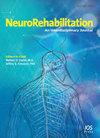Musculoskeletal morbidity in adults with spinal cord injuries: A nationwide cohort study
IF 1.7
4区 医学
Q3 CLINICAL NEUROLOGY
引用次数: 0
Abstract
BACKGROUND:An increase in the demand for quality of life following spinal cord injuries (SCIs) is associated with an increase in musculoskeletal (MSK) pain, highlighting the need for preventive measure research. OBJECTIVE:This study aimed to evaluate the incidence and hazards of MSK morbidities among Korean adults with SCIs, as well as the influence of SCI location on MSK morbidities. METHODS:Patient populations were selected from Korean National Health Insurance Service data (n = 276). The control group included individuals without SCIs (n = 10,000). We compared the incidences and determined the unadjusted and adjusted hazard ratios (HRs) of common MSK morbidities (osteoarthritis, connective tissue disorders, sarcopenia, myalgia, neuralgia, rheumatoid arthritis, myositis, and musculoskeletal infections) based on the location of injury (cervical, thoracic, or lumbar). RESULTS:Adults with SCIs had a higher incidence of MSK morbidity (48.45% vs. 36.6%) and a lower survival probability than those without SCIs. The incidence of MSK morbidity and survival probabilities were not significantly different for cervical cord injuries, whereas both measures were significantly different for thoracic and lumbar injuries. CONCLUSION:SCI increases the risk of MSK morbidity. Lumbar SCI is associated with a higher incidence and risk of MSK morbidity than are cervical or thoracic SCIs.脊髓损伤成人的肌肉骨骼发病率:全国性队列研究
背景:脊髓损伤(SCI)后,人们对生活质量要求的提高与肌肉骨骼(MSK)疼痛的增加有关,这凸显了预防措施研究的必要性。目的:本研究旨在评估韩国脊髓损伤成人 MSK 疾病的发病率和危害性,以及脊髓损伤位置对 MSK 疾病的影响。方法:从韩国国民健康保险服务数据(n = 276)中选取患者群体。对照组包括无 SCI 的个体(n = 10,000)。我们比较了常见 MSK 疾病(骨关节炎、结缔组织疾病、肌肉疏松症、肌痛、神经痛、类风湿性关节炎、肌炎和肌肉骨骼感染)的发病率,并根据受伤部位(颈椎、胸椎或腰椎)确定了未经调整和调整的危险比(HRs)。结果:与无 SCI 的人相比,有 SCI 的成年人 MSK 发病率更高(48.45% 对 36.6%),存活概率更低。颈部脊髓损伤的 MSK 发病率和存活概率没有显著差异,而胸椎和腰椎损伤的 MSK 发病率和存活概率则有显著差异。结论:脊髓损伤会增加多发性硬化症的发病风险。与颈椎或胸椎 SCI 相比,腰椎 SCI 的发病率和 MSK 发病风险更高。
本文章由计算机程序翻译,如有差异,请以英文原文为准。
求助全文
约1分钟内获得全文
求助全文
来源期刊

NeuroRehabilitation
CLINICAL NEUROLOGY-REHABILITATION
CiteScore
3.20
自引率
0.00%
发文量
178
审稿时长
6-12 weeks
期刊介绍:
NeuroRehabilitation, an international, interdisciplinary, peer-reviewed journal, publishes manuscripts focused on scientifically based, practical information relevant to all aspects of neurologic rehabilitation. We publish unsolicited papers detailing original work/research that covers the full life span and range of neurological disabilities including stroke, spinal cord injury, traumatic brain injury, neuromuscular disease and other neurological disorders.
We also publish thematically organized issues that focus on specific clinical disorders, types of therapy and age groups. Proposals for thematic issues and suggestions for issue editors are welcomed.
 求助内容:
求助内容: 应助结果提醒方式:
应助结果提醒方式:


